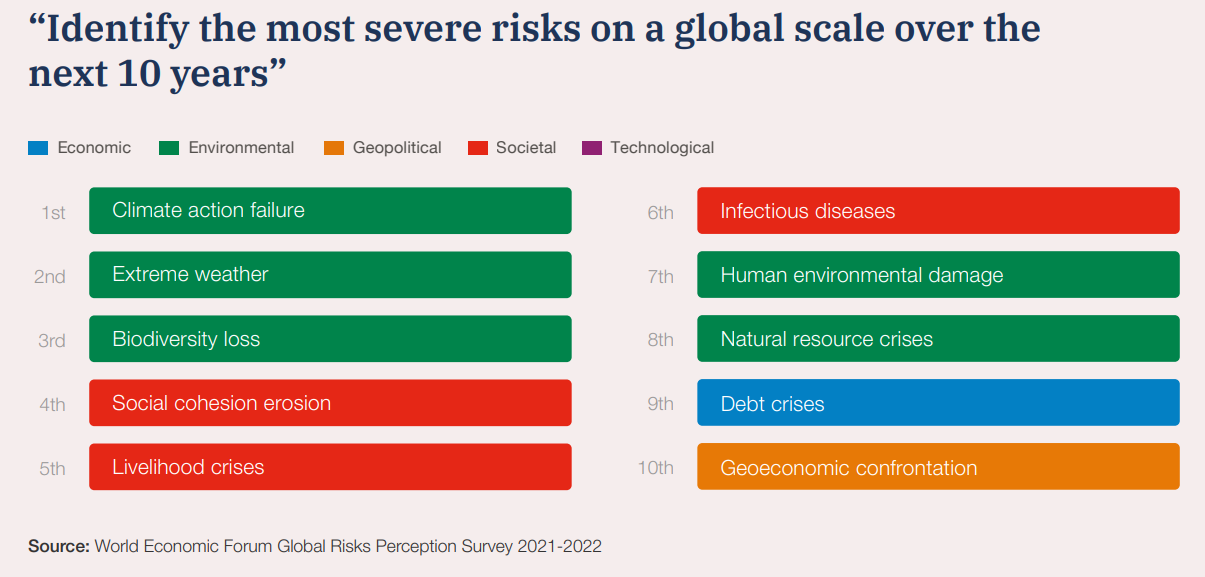
The 2021 edition of the Global Risk Report had warned against the materialization of economic risks that have then become reality. All countries, with different timelines, are facing supply chain crises, inflation, debt, problems in the labor market, protectionism, educational inequalities. Compelling problems that divert attention and resources from more long-term challenges, such as the climate transition, digital vulnerabilities, migratory movements, the space race. Restoring trust and fostering cooperation within and between countries will be key to addressing these challenges.
The 17th edition of the Global Risk Report, the document drawn up by the World Economic Forum which each year identifies the risk trends that will guide the following months, predicts growing tensions due to the different strategies that countries will implement on key issues.
Specifically, there are six guidelines along which potential problems will be concentrated:
A divergent and uneven economic recovery
Although the pandemic shock has been partially absorbed, the expansion of the world economy is threatened by some factors, such as the rise in commodity prices, inflation and the accumulated debt in recent years. Furthermore, the uneven levels of citizens' vaccination and ability to adapt to the pandemic context risk placing the various countries on diverging growth trajectories, making international cooperation more difficult. Finally, the social disparities increased by the pandemic represent a further element of concern.
A turbulent climate transition
The transition to a more sustainable economy from an environmental point of view is one of the challenges of our century. However, a scarce and unfriendly commitment in this sense risks amplifying the problems. If, on the one hand, insisting on the development of polluting sectors is an expensive and inefficient strategy, it is nevertheless true that a sudden and improperly managed reconversion could lead to the aggravation of social disparities.
Digital security
The pandemic has significantly accelerated the adoption of digital solutions in every sector of society. While the digital transition is essential for increasing productivity and improving the quality of our lives, it poses risks related to cybersecurity. Intangible risks - such as disinformation, fraud and cyber attacks - which will become increasingly widespread and will push companies and organizations to face new costs to protect themselves and manage damage.
International mobility and migration
Worldwide, more than 34 million people expatriated due to wars and conflicts were registered in 2020, a historic record. At the same time, however, the effects of the pandemic, growing political-economic protectionism and new dynamics in the labor markets have made migratory movements more difficult. This tightening risks causing tensions at the borders, geopolitical exploitation of migrants and greater risks and difficulties for migrants and refugees. Finally, if on the one hand the families of migrants who remain in the countries of origin will be able to rely less on remittances, with increasing economic difficulties, on the other hand the countries of destination may have difficulties in finding specific skills on the internal labor market. .
An increasingly crowded space
The exploitation of space for commercial purposes is growing rapidly. The entry of new players into the commercial satellite business is revolutionizing some markets, such as internet communication services. This rapid development of the sector poses governance challenges and probably renders the current regulatory frameworks obsolete. If not managed, the phenomenon could increase some risks linked, for example, to possible collisions between satellites. Furthermore, an aspect that should not be underestimated and which could lead to geopolitical risks is the exploitation of space in a military key.
Pandemic resilience capacity
After two years of the pandemic, two fundamental aspects in pandemic risk management have clearly emerged. First, the ability to make decisions quickly and proactively adapt to changing conditions has proved to be fundamental. Furthermore, it was important to preserve and nurture citizens' trust in institutions with well-motivated and well-communicated decisions. Failure to comply with these principles can be considered a significant risk.
THE TOP 10
Moving the horizon further, in the medium to long term (10 years) the most significant risks will be those of an environmental and social nature, which respectively occupy five and three of the top ten places.
